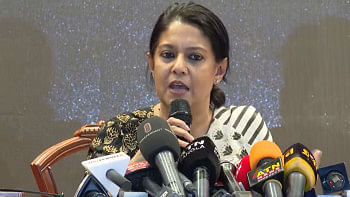CSO Sustainability Index: Environment continues to worsen

Civil society organisations working on democracy, good governance, and human rights last year were subject to strict control by the regulatory authorities and various types of bureaucratic harassment in Bangladesh, says a global index report.
The overall sustainability of the organisations deteriorated slightly, according to the 2020 Civil Society Organizations Sustainability Index, Bangladesh.
"The legal environment governing CSOs deteriorated slightly in 2020. CSOs continued to face prolonged registration and renewal processes and bureaucratic delays throughout 2020, and Covid-19 restrictions increasingly limited civic space and CSOs' ability to operate," it reads.
Besides, they were increasingly engaged in self-censorship to avoid clashes with the government, according to the report by the United States Agency for International Development (USAID).
"As in previous years, the government continued to use the DSA [Digital Security Act] to severely limit freedom of expression, thereby impacting CSOs' ability to exercise their freedom of speech, criticise the government, or engage in advocacy."
The report was launched in an international event held virtually on Thursday night. Seventy-three countries were covered in the global index in 2020. USAID has been producing the annual index since 1997. Bangladesh first came under the indexing in 2014.
An expert panel suggests the scores for each country based on publicly available information and data. A US-based editorial committee finalises the score and produces the report.
The index measures civil society sectors' strength and overall viability based on seven dimensions: legal environment, organisational capacity, financial viability, advocacy, service provision, infrastructure, and public image. On a scale of one to seven, lower numbers indicate more robust levels of CSO sustainability.
Bangladesh scored 4.0 this time. It was 3.5 in 2014 and 2015. The country's index continued to decline for five years in a row.
The CSO sector includes self-governing formal and informal organisations, usually of non-profit nature, such as non-government organisations, community-based organisations, faith-based organisations, social movements, trade unions, women's groups, and research institutes and think tanks.
The exact number of CSOs is hard to ascertain as they can register under various departments of the government. However, more than 88,000 organisations are registered with three key government authorities -- Department of Social Services (DSS), Women Affairs and Labour, and the NGO Affairs Bureau (NGOAB).
More than 63,000 organisations are registered under DSS.
"The government does not actively impede the activities of NGOs focused on development issues such as the rights to food and shelter. However, government surveillance continues to be a concern, particularly for CSOs working in sensitive fields such as democracy, governance, and human rights."
It said those working with and on behalf of Rohingya refugees reported increased local administrative surveillance and bureaucratic hurdles.
On bureaucratic red-tape, the report said the process of registering with NGOAB should officially be completed within 90 working days, but the process often extends far beyond this timeframe due to the involvement of several ministries and slow bureaucratic processes.
The countrywide lockdown last year closed NGOAB offices, delaying registration approvals for several months, it said.
Typically, CSOs participate in steering committee meetings of various ministries as well as district and subdistrict coordination meetings, but those meetings were held only sporadically last year due to Covid restrictions, it said.
"Policymaking has become increasingly bureaucratic in recent years, and all the more so in 2020 during the national health crisis around Covid-19.
"Because government administrations were busy with Covid-19 relief and management, many public policy decisions were instead led by bureaucrats outside of parliament."
This made CSO advocacy increasingly complicated and time-consuming, as decisions were more often made in bureaucratic back offices.
However, in a few areas such as socio-economic development, natural disasters, and climate change, the government welcomed input from civil society in planning, formulating policies and strategies, and formulating laws.
The financial viability of the CSO sector, which depends heavily on foreign donors, deteriorated slightly in 2020 with the shift of funding toward emergency needs including both Covid-19 response and relief and the Rohingya crisis contributed to this decline.
Given the global financial impact of Covid-19, foreign support declined notably last year. The CSOs registered with the NGOAB faced a 17 percent reduction in committed foreign grants, from around $1 billion in FY 2019 to around $900 million in FY 2020.
"Many CSOs struggle to access foreign funding due to information gaps and their lack of personnel capacity and expertise."
The public image of the civil society organisation also deteriorated slightly due mainly to their lack of responsiveness during the Covid-19 pandemic and difficulties in meeting emergency needs.
"The CSOs struggled to meet the increased need for support during the Covid crisis. While larger NGOs with some experience in emergency responses were able to provide critical assistance during the health crisis, most CSOs failed to provide even a minimum level of support to communities in need.
"This not only left marginalised communities without adequate support, but also spurred a decline in trust from a large portion of the public."
Besides, a significant number of people negatively viewed most CSOs, especially those engaged in promoting gender equality and democratic rights, it added.
The situation in two other dimensions -- service provision and infrastructure supporting -- also deteriorated as government support and foreign funds previously allocated for traditional CSO activities were halted or redirected to emergency needs.
However, the organisational capacity within the CSO sector remained unchanged in 2020 as most of the organisations showed considerable adaptability and resilience by instituting new approaches to their work, the report added.


 For all latest news, follow The Daily Star's Google News channel.
For all latest news, follow The Daily Star's Google News channel. 



Comments